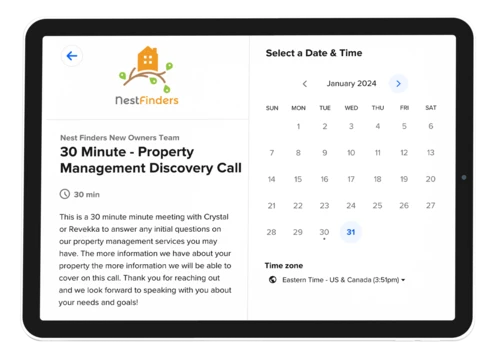Navigating the rental property landscape in Jacksonville, Florida, can be a rewarding pursuit for landlords and investors.
Jacksonville attracts more residents yearly because of its vibrant culture, growing economy, and beautiful coastlines. That growing popularity makes it a prime location for rental investments.
However, understanding local landlord-tenant laws is crucial to making the most of your investment. In this context, the question arises: is Jacksonville landlord-friendly?
Florida Landlord Tenant Laws
Florida landlord-tenant laws are designed to facilitate a fair and balanced rental market. At Nest Finders, we recognize the importance of staying informed about these laws to ensure smooth operations and avoid potential legal disputes.
One of the most landlord-friendly aspects of Jacksonville is the streamlined eviction process. Florida law allows landlords to remove tenants for non-payment of rent and lease violations with relatively short notice periods.
For instance, if a tenant fails to pay rent, you can provide a three-day written notice before initiating eviction proceedings. This efficiency in the process helps landlords regain control of their properties quickly, minimizing financial losses.
Just like landlords in every other state, Florida landlords must comply with the Florida Fair Housing Act, which prohibits discrimination based on race, color, religion, sex, national origin, disability, or familial status. Adherence to this law is vital for maintaining a positive landlord-tenant relationship and avoiding legal issues.
Long-Term Lease Agreement
A robust lease agreement is essential for preventing disputes and ensuring clarity in the landlord-tenant relationship. Both the landlord and tenant should be clear about their rights and responsibilities. Key elements to include are the rental unit's address, monthly rent amount, security deposit, and terms regarding security deposits.
Lease agreements should also outline the conditions under which either party can terminate the rental agreement. Include specific language about the lease agreement termination process to protect both yourself and the tenant equally.
For residential landlords in Florida, having a written rental agreement is advisable, even if it’s not legally required. This can prevent misunderstandings and provide a clear framework for resolving issues like unpaid rent or property maintenance.
Short-Term Rental Agreement
Understanding the distinctions between rental agreements and lease agreements can help landlords manage their properties more effectively. Rental agreements tend to cover shorter terms than long-term leases and can even be month-to-month. They are also often more flexible than fixed-term lease agreements.
Rental agreements in Florida require clarity on rental payments, security deposits, and tenant rights. Landlords should ensure rental agreements are comprehensive and align with Florida landlord-tenant laws. This includes specifying the rent payment period and procedures for advance rent deposits.
Laws That Make Florida Landlord-Friendly
Florida's legal landscape provides a supportive environment for landlords, making it one of the most landlord-friendly states in the country. Here are some key aspects of Florida's legal framework that favor landlords:
Absence of Rent Control: Unlike many other states, Florida does not impose rent control laws. This absence allows landlords to set and adjust rental rates based on market demand without government restrictions. It provides the flexibility to respond to economic changes, optimizing rental income and maximizing returns on investment.
Flexibility in Setting Rental Terms: Florida's laws grant landlords considerable leeway in establishing rental terms. Landlords can define rent payment schedules, late fees, and grace periods to suit their business needs. Notably, there are no specific laws regulating the amount of late fees, allowing landlords the freedom to determine them. This autonomy helps landlords maintain financial stability and adapt to market conditions.
Security Deposit Management: Florida law allows landlords to charge any amount for security deposits, providing flexibility to safeguard their properties against potential damages or unpaid rent. The lack of a cap means landlords can adjust deposits according to their risk assessment. The clear regulations on holding and returning security deposits ensure transparency and protect landlords' interests.
These laws collectively empower Florida landlords to manage their properties effectively, respond quickly to market dynamics, and safeguard their investments, fostering a conducive environment for rental property management.
Practical Tips for Landlords in Jacksonville
To thrive in Jacksonville's rental market, consider these practical tips:
Stay Informed: Regularly update yourself on Florida landlord-tenant laws and any changes in local regulations. This knowledge will help you make informed decisions and stay compliant.
Clear Lease Agreements: Draft detailed lease agreements that outline the rights and responsibilities of both parties. Include clauses on rent, security deposits, maintenance obligations, and entry protocols to avoid misunderstandings.
Screen Tenants Thoroughly: Implement a robust tenant screening process to select reliable tenants. Background checks, credit reports, and references can help you find tenants who will respect your property and fulfill their lease obligations.
Document Everything: Keep detailed records of all communications, lease agreements, maintenance requests, and financial transactions. Documentation can be invaluable in resolving disputes and protecting your interests.
Engage Professionals: Consider hiring a property management company like Nest Finders to handle the complexities of managing your rental property. Professional management can optimize your investment and ensure compliance with all legal requirements.
Navigating Legal Resources and Support for Landlords and Tenants
Both landlords and tenants in Jacksonville have access to a wide range of legal resources designed to facilitate a harmonious landlord-tenant relationship. The city's legal framework provides mechanisms for resolving disputes, ensuring compliance with Florida landlord-tenant laws, and protecting the rights of both parties.
For landlords, engaging with licensed real estate brokers or property management companies can provide invaluable support in understanding the nuances of local regulations and implementing best practices.
These professionals can assist with drafting lease agreements, managing tenant communications, and handling legal proceedings if necessary. Additionally, landlords can benefit from attending local workshops or seminars on real estate laws to stay updated on legislative changes and learn strategies for effective property management.
Invest in Jacksonville, Florida Today
Jacksonville offers a landlord-friendly environment with its flexible rental policies and efficient legal processes. By understanding the laws that matter and adopting best practices, you can navigate this market with confidence and achieve a successful rental business.
Remember, staying informed and proactive is key to maximizing your investment potential while fostering positive relationships with your tenants. Whether you're a seasoned property investor or a first-time landlord, Jacksonville's dynamic market presents opportunities that are well worth exploring.
At Nest Finders, we're here to support you every step of the way, ensuring your rental journey is as smooth and profitable as possible. You can learn more about our property management team here!




